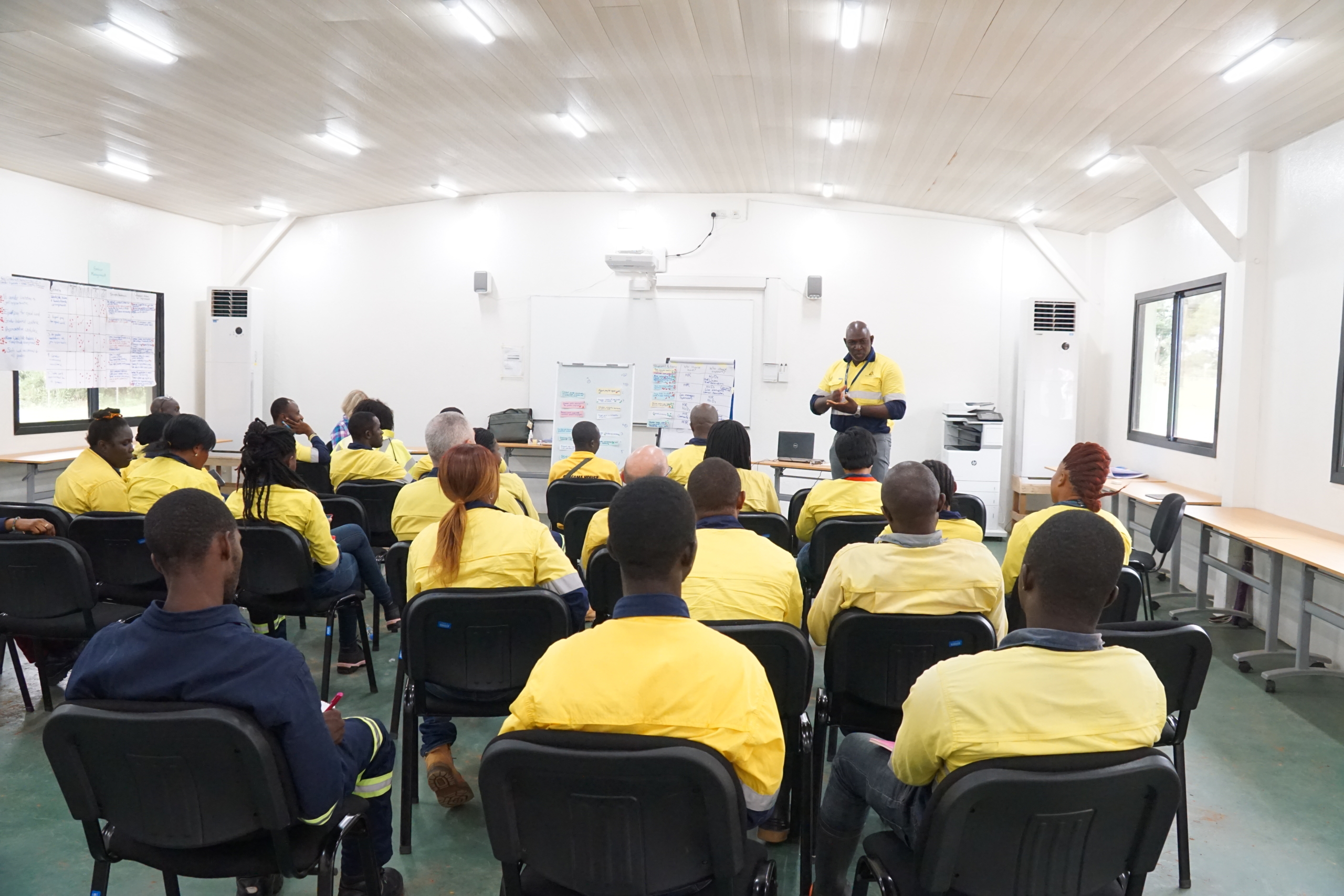
Sierra Rutile Limited (SRL), Mining, Sierra Leone
Sierra Rutile Limited’s (SRL) virtual CSC helped advance gender diversity and inclusion in Sierra Leone.
 Photo by IFC
Photo by IFC
Sierra Rutile deploys CSCs to engage staff and drive gender inclusivity
Sierra Rutile Limited (SRL) is Sierra Leone’s leading mining company and among the country’s largest private sector employers, with a footprint that currently spans five chiefdoms and a population of about 150,000 people. Facing significant challenges with gender equality in Sierra Leone and operating in a traditionally male-dominated industry, SRL has committed to increasing the number of female employees and improving women’s career prospects and working environment.
With IFC’s help, SRL embarked on its journey to improve gender inclusion beginning in 2019. Together, SRL and IFC designed and implemented a community scorecard (CSC) process to engage with employees internally and to assess the company’s performance as a gender-equitable and women-friendly employer. The first step involved meeting with various staff organizations, such as the union, the women’s association, and the staff association. These preliminary meetings were important because they helped to:
- Validate relevant background information.
- Explain the proposed CSC process and receive feedback.
- Collect advice on the stakeholder groups/participants to include.
- Gain buy-in to mobilize participants.
Assessment meetings identified areas for improvement
The next step involved convening assessment meetings. During this process, facilitators conducted five meetings, involving 85 staff members in separate sessions for male and female general and senior staff. One session with company leaders included both male and female participants. The team purposely decided against including senior executives such as the CEO, COO and human resources director to encourage open and honest discussion. In the meetings, the employee groups identified the key characteristics of a gender-equitable company, ranking SRL’s performance against those characteristics and highlighting specific areas where changes were needed. Among the important characteristics noted by participants: opportunities to express views and be heard; measures to protect against inappropriate attitudes, behaviors, and sexual harassment; and gender balance in top management. Among the proposed actions to bring about needed change: assigning tasks that would allow women to prove their leadership capabilities and identifying girls to participate in community scholarship program.
At the final interface meeting, representatives of each of the groups shared the characteristics they identified and collectively agreed on a plan of action.
Company-organized gender task force complements CSC process
During this same period, SRL created a gender task force—a small group of SRL employees who could represent the viewpoints of men and women in the workforce, under the leadership of senior management. To ensure continuity between the dialogue developed through the CSC process and subsequent deliberations on gender initiatives to be led by the task force, the employee representatives who participated in the final CSC interface meeting were invited to join the task force.
With the help of IFC, this task force conducted a formal gender assessment of SRL. Of note: The task force has indicated that the CSC process helped send a strong internal message that the company was serious about gender inclusion.
Second CSC pivots to virtual during covid
In 2020, following the gender assessment and based on employee feedback and industry best practices, the company put in place a gender action plan. That same year, a second CSC process was planned, with the goal of assessing SRL’s progress towards creating a more equitable and women-friendly workplace environment. The timing coincided with the onset of the covid-19 pandemic and the subsequent global shutdown of in-person activities due to the public health crisis.
Instead of postponing, the SRL and IFC team adapted materials and processes for a virtual format. A joint team, including a facilitator experienced in the CSC methodology and a local facilitator, delivered the CSC remotely, in a series of facilitated Zoom meetings with 39 SRL participants, including representatives from various staff groups.
During the assessment meetings, participants acknowledged both company strengths and weaknesses. The virtual scorecard process reconfirmed existing actions and added several new ones, such as upgrading onsite, women-focused health services. Following participation in the second CSC, 94 percent of participants found the CSC process “very useful.” One hundred percent of participants indicated interest in participating in a future CSC.
Lessons learned
- Using tools such as the CSC can add value to an overarching effort to integrate a gender lens into operations. Since the CSC was an innovation, SRL conducted the CSC separately from the formal gender assessment. In the future, the design of the gender assessment should integrate the CSC process.
- Getting input from employees and other constituent groups can improve the design of the CSC process and secure employee buy-in.
- Organizing separate assessment meetings for different staff levels—including senior management—and convening them as single-gender meetings is a key to open and honest communication.
- Having senior managers at the final interface meeting proved extremely important, indicating to participants that the company was taking the process seriously, even though the managers were intentionally not invited to the other groups’ assessment meetings.
- Engaging in the CSC process is about continuous improvement. It helps create accountability and maintain momentum as participants receive information on existing policies, procedures, standards, and actions and engage in informed dialogue. As such, provision of relevant information is critical for ensuring ongoing and constructive employee dialogue. The timing of CSC should align with implementation of milestones along the company’s gender journey, to enable assessment of progress.
- Conducting discussions on gender-friendly working environment and existing strengths and weaknesses can be sensitive, so it is important to plan ahead on how to handle difficult conversations, such as those relating to sexual harassment. It is also critical to have experienced and neutral facilitators to manage such potentially sensitive discussions.
For more information on gender assessments and other inclusivity tools please see the IFC Gender in Infrastructure Toolkit.

Want to implement a CSC?

THE COMMUNITY SCORECARD IS SUPPORTED BY:
